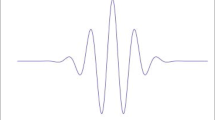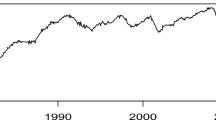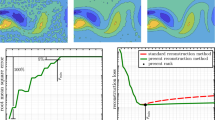Abstract
Although empirical mode decomposition (EMD) lacks a rigorous theoretical basis, it has attracted much attention for analyzing nonstationary signals adaptively. In this paper, the EMD method is investigated from a digital signal processing perspective. Based on an analysis of extrema sampling and B-spline interpolation, we show that the upper and lower envelopes of signals are formed by a succession of three basic operations: decimation of local extrema, interpolation, and filtering by a B-spline filter. We then show that some aliasing noise can be suppressed by the mean of the envelopes, though the extrema sampling is a sub-Nyquist sampling. For uniformly spaced extrema of signals, we derive a general analytical expression of intrinsic mode functions (IMFs) extracted by the EMD method from signals.











Similar content being viewed by others
References
B. Boashash, Estimating and interpreting the instantaneous frequency of a signal—part 1: fundamentals. Proc. IEEE 80(4), 520–538 (1992)
C.D. Boor, A Practical Guide to Splines—Revised Edition (Springer, New York, 2001)
A.O. Boudraa, J.C. Cexus, EMD-based signal filtering. IEEE Trans. Instrum. Meas. 56(6), 2196–2202 (2007)
A. Bouzid, N. Ellouze, Maximum error in discrete EMD decomposition of periodic signals, in Proc. 15th Int. Conf. Digital Signal Process (2007), pp. 563–566
Q.H. Chen, N. Huang, S. Riemenschneider et al., A B-spline approach for empirical mode decomposition. Adv. Comput. Math. 24, 171–195 (2006)
R. Deering, J.F. Kaiser, The use of a masking signal to improve empirical mode decomposition, in Proc. IEEE Int. Conf. Acoust., Speech Signal Process (2005), pp. 485–488
E.H.S. Diop, R. Alexandre, A.O. Boudraa, A PDE characterization of the intrinsic mode function, in Proc. IEEE Int. Conf. Acoust., Speech Signal Process (2009), pp. 3429–3432
P. Flandrin, G. Rilling, P. Goncalvés, Empirical mode decomposition as a filter bank. IEEE Signal Process. Lett. 11(2), 112–114 (2004)
M. Henker, G. Fettweis, Extended algorithms for sample rate conversion, in Proc. 2nd Karlsruhe Workshop on Software Radios (2002), pp. 33–40
N.E. Huang, Z. Shen, S.R. Long et al., The empirical mode decomposition and Hilbert spectrum for nonlinear and non-stationary time series analysis. Proc. R. Soc. Lond. A 454, 903–995 (1998)
A.J. Jerri, The Shannon sampling theorem—its various extensions and applications: a tutorial review. Proc. IEEE 65(11), 1565–1596 (1977)
Y. Kopsinis, S. McLaughlin, Investigation and performance enhancement of the empirical mode decomposition method based on a heuristic search optimization approach. IEEE Trans. Signal Process. 56(1), 1–13 (2008)
D.S. Laila, A.R. Messina, B.C. Pal, A refined Hilbert–Huang transform with applications to interarea oscillation monitoring. IEEE Trans. Power Syst. 24(2), 610–620 (2009)
J. Li, R.M. Gray, Context-based multiscale classification of document images using wavelet coefficient distributions. IEEE Trans. Image Process. 9(9), 1604–1616 (2000)
N. Rehman, D.P. Mandic, Multivariate empirical mode decomposition. Proc. R. Soc. Lond. A 466, 1291–1302 (2010)
G. Rilling, P. Flandrin, One or two frequencies? The empirical mode decomposition answers. IEEE Trans. Signal Process. 56(1), 85–95 (2008)
N. Senroy, S. Suryanarayanan, Two techniques to enhance empirical mode decomposition for power quality applications, in Proc. IEEE Power Eng. Society General Meeting (2007), pp. 1–6
N. Senroy, S. Suryanarayanan, P.F. Ribeiro, An improved Hilbert–Huang method for analysis of time-varying waveforms in power quality. IEEE Trans. Power Syst. 22(4), 1843–1850 (2007)
M. Unser, Splines: a perfect fit for signal and image processing. IEEE Signal Process. Mag. 16(6), 22–38 (1999)
M. Unser, Sampling—50 years after Shannon. Proc. IEEE 88(4), 569–587 (2000)
M. Unser, A. Aldroubi, M. Eden, Fast B-spline transforms for continuous image representation and interpolation. IEEE Trans. Pattern Anal. Mach. Intell. 13, 277–285 (1991)
M. Unser, A. Aldroubi, M. Eden, Polynomial spline signal approximations: filter design and asymptotic equivalence with Shannon’s sampling theorem. IEEE Trans. Inf. Theory 38(1), 95–103 (1992)
M. Unser, A. Aldroubi, M. Eden, B-spline signal processing: part I—theory. IEEE Trans. Signal Process. 41(2), 821–833 (1993)
P.P. Vaidyanathan, Multirate digital filters, filter banks, polyphase networks, and applications: a tutorial. Proc. IEEE 78(1), 56–93 (1990)
Z.H. Wu, N.E. Huang, A study of the characteristics of white noise using the empirical mode decomposition method. Proc. R. Soc. Lond. A 460, 1597–1611 (2004)
Z.H. Wu, N.E. Huang, Ensemble empirical mode decomposition: a noise-assisted data analysis method. Adv. Adapt. Data Anal. 1, 1–41 (2009)
Y.L. Yang, Theoretical analysis and application investigation of empirical mode decomposition. Ph.D. dissertation, Sch. of Mech. Eng., Beijing Inst. of Technol., Beijing, China, 2010
Y.L. Yang, J.H. Deng, W.C. Tang et al., Nonuniform extrema resampling and empirical mode decomposition. Chin. J. Electron. 18(4), 759–762 (2009)
Acknowledgement
The authors would like to thank Prof. Ran Tao for many helpful discussions.
Author information
Authors and Affiliations
Corresponding author
Rights and permissions
About this article
Cite this article
Yang, Y., Miao, C. & Deng, J. An Analytical Expression for Empirical Mode Decomposition Based on B-Spline Interpolation. Circuits Syst Signal Process 32, 2899–2914 (2013). https://doi.org/10.1007/s00034-013-9592-5
Received:
Revised:
Published:
Issue Date:
DOI: https://doi.org/10.1007/s00034-013-9592-5




